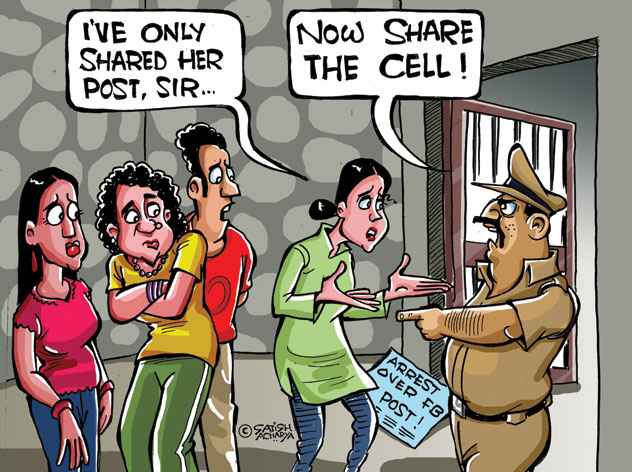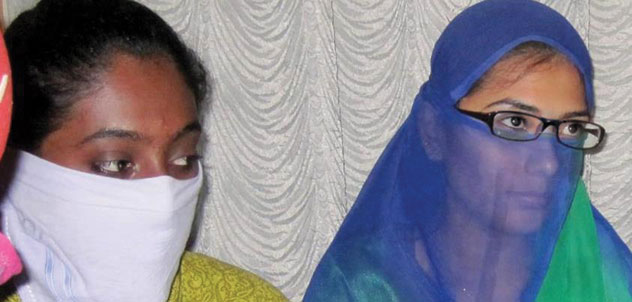CURRENT AFFAIRS:
Officials Misuse Law: A Post on Social Media Could Get You Arrested
In India, if a law can be misused, it will be. Invariably, it is the state that makes a victim of ordinary innocent folks without the ability to push back, as was evident in the recent events that unfolded over a post on Facebook, writes Siddharth Srivastava.

(Above): Illustration by Satish Acharya
The latest instance of abuse is the gross overreach in reading provisions in India’s Information Technology Act, 2008, by the police, obviously acting at the behest of their political masters or other vested interest.
This said law applies to disseminating content posted via communication devices such as mobile phones or computers on the Internet. India’s youth that form the majority of the country’s population are the pre-dominant users of such media.
However, deliberate misuse of stipulations such as Section 66A that seeks to check offensive and menacing digital posts has infringed on basic rights of speech and expressions.
In the latest instance two young girls, Shaheen Dhada and Renu Shrinivas, in their early 20s, were arrested for voicing an innocuous opinion on Facebook on the shutdown of Mumbai due to the passing away of local leader Bal Thackeray.
Prior to this, a tweet against finance minister P. Chidambaram’s son lead to the arrest of Ravi Srinivasan in Pondicherry. In September, it was the Mumbai police again that arrested cartoonist Aseem Trivedi for poking fun of politicians and Parliament. A professor in Kolkata was arrested for mailing cartoons of Mamata Banerjee, the chief minister of West Bengal.
Offenses under Section 66A of the IT Act have been made cognizable which means that the police can arrest an individual after registering a complaint, as opposed to the powers resting with a judicial magistrate.
Matters left to the subjective assessment of cops in India, is asking for trouble given their high-handed working. The youth of course is always vulnerable. For example, a law against indecency in public that dates back to the British colonial times is regularly misused to victimize young couples.
Clearly Section 66A is a bad law that seems to have escaped the requisite legislative scrutiny in the Parliament, which is not surprising given the lack of decorum and multiple adjournments in the functioning of India’s apex law-making body. Such Internet censorship also betrays lack of basic understanding of the way the online medium functions by allowing millions to voice concerns, views, spoof, criticize and caricature in a public domain, without being disruptive or violent.
The liberating role of the Internet as opposed to citizens being able to express in the limited TV time or editorial space of mainstream media is well documented.

(Above): Shaheen Dhada and Renu Shrinivas
It is also ironical that Renu and Shaheen were picked up by the police in the middle of the night, but no action was taken against supporters of Thackeray who vandalized a relatives’ clinic, until TV reports highlighted the matter.
Thackeray himself thrived on politics that was blatantly communal, with violence an instrument to convey his flagrant message. Politicians are known to regularly make incendiary speeches that incite communities.
There is clearly a mental disconnect between online users and those who are supposed to monitor such usage. The divide spans English speaking skills, computer literacy and use of multimedia to connect, entertain and inform.
The police in Maharashtra, for example, exist in the cocoon of a highly politicized real world cut off from the social networking hubs such as Twitter or Facebook that can instantly congregate a crowd of opinions from diverse locations anywhere.
Following the recent events, analysts and even federal ministers have spoken about the need to amend Section 66 by permitting a higher authority as opposed to the easily influenced lower constabulary to sanction arrest for posting material that could be considered anti-national or seditious.
Renu Srinivasan and Shaheen Dhada finally found relief as their case was closed without any chargesheet being filed by Maharashtra Police.
Yet, altering one statute will not change the systemic rot. Too many in this country know that they can break the law and get away with it. The biggest infringers are those who are supposed to be the custodian and guardians of the law.
It is a well-accepted fact in Indian polity that the political class cutting across party affiliations follows an unwritten code of not launching personal attacks on each other. There are too many skeletons in everybody’s cupboard.
Conviction rates in India for heinous crimes are among the lowest in the world. Thieves, robbers, rapists, hit-and-run cases abound and move about freely, granted bail due to dubious investigations, destruction of evidence, killing or scaring away witnesses and bribing of officials.
Land use laws, mining and road contracts, even child nutrition programs are tinkered to suit a few vested interests. Illegal construction, parking space, slum dwelling, prostitution and more are allowed to proliferate at a price paid to civic agencies and police. India is changing. There is an ongoing tussle between the good and the bad. Hopefully, the good prevails.
|